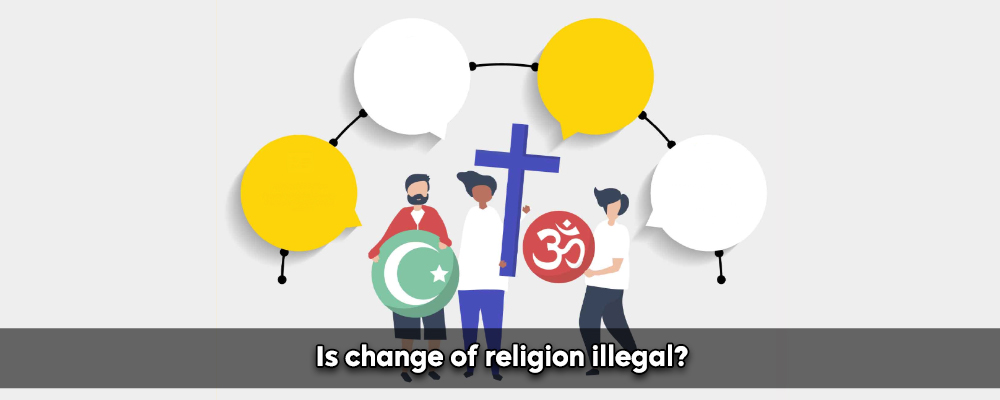It is impossible to overlook the significance of religion in Indian society. Every aspect of an Indian’s life, including politics and family relationships, is influenced by their religion. Religious variety is quite evident in India, where Hindus, Muslims, Christians, Sikhs, Parsis, and many more religious groups cohabit in the same area. Though it may sound consoling, the idea of unity in variety is not without its difficulties.
Forced religious conversions have occurred a great deal in India in the past and continue to do so. In a civilized democratic democracy, these conversions should not be permitted since they violate the fundamental principles of human rights.
Need A Legal Advice
The internet is not a lawyer and neither are you. Talk to a real lawyer about your legal issue

Religious Conversion: About
- Adopting a set of beliefs associated with one specific religious denomination at the expense of others is known as religious conversion.
- Therefore, the term “religious conversion” would refer to the process of leaving one denomination and joining another.
- For instance, Shia Muslims to Sunni Muslims, and Christian Baptists to Methodists or Catholics.
- Religious conversion is sometimes associated with a change in one’s religious identity and is represented by unique rites.
Article 25 of Indian Constitution
Everyone in India is guaranteed the freedom of religion by Article 25 of the Constitution. It stipulates that everyone in India, subject to laws pertaining to morals, public order, health, and other matters:
- Possess an equal right to freedom of conscience
- Possess the freedom to openly declare, practice, and propagate their religion.
The Emergence of Anti-conversion Law: Post Colonial Era
- A body of legal regulations known as anti-conversion laws forbids or restricts the conversion of one religion into another.
- The purpose of these legislations is to stop religious organizations from recruiting adherents of other religions and to stop the forced conversion of persons to their religion.
- The Union Law Ministry stated in 2015 that legislation pertaining to fictitious religious conversions cannot be implemented nationally. According to the Indian constitution, states are free to pass state anti-conversion laws because these issues are under their purview.
Legal Procedure for Changing Your Religion
The practice of changing one’s faith is unregulated by legislation. The Supreme Court has declared repeatedly that specific legal requirements, formalities, religious ceremonies, or rituals do not apply to conversions.
Anybody can convert to a different religion as long as they do so in good faith. Conversion is not the same as a spoken or written proclamation on its own. It is necessary to provide credible evidence of the intention to convert, followed by overt acts that show that desire. It would be sufficient to conclude that genuine conversion has a place when activities are taken that demonstrate the earnest intention behind the conversion.
- The government gazette must first be notified of the religious conversion.
- It is up to the Registration Officer to decide if the conversion is legal or not.
- Anyone who wants to convert to a different religion may do so by abiding by the religion’s personal laws. There are various personal rules that specify the ceremonies that must be performed in a particular manner at conversion.
Religious Conversion: Documents Required
- Identity proofs include voter IDs, driver’s licenses, passports, Aadhar cards, and Pan cards;
- Address Proof including utility bills and ration cards.
- Passport-size photographs
- Application Form – an application that is correctly completed and contains the applicant’s old and new names, current address, contact details, and the reason for the religious conversion.
It would take ten to fifteen days to draft the application for a religious conversion. After 45 to 60 business days of receiving the application, the publication will be made available. In order to find out the status, the applicant must also regularly visit the office of the Gazette publication.
Your application may be rejected if it is incomplete, misleading, illegal, or ambiguous. There will be unpleasant delays as a result. As such, you must proceed with prudence before to completing your application for a religious conversion. To make sure the papers are authentic and in the right order, you need to exercise due diligence by getting assistance from an expert lawyer.
One can talk to a lawyer from Lead India for any kind of legal support. In India, free legal advice online can be obtained at Lead India. Along with receiving free legal advice online, one can also ask questions to the experts online free through Lead India.





 Talk to a Lawyer
Talk to a Lawyer